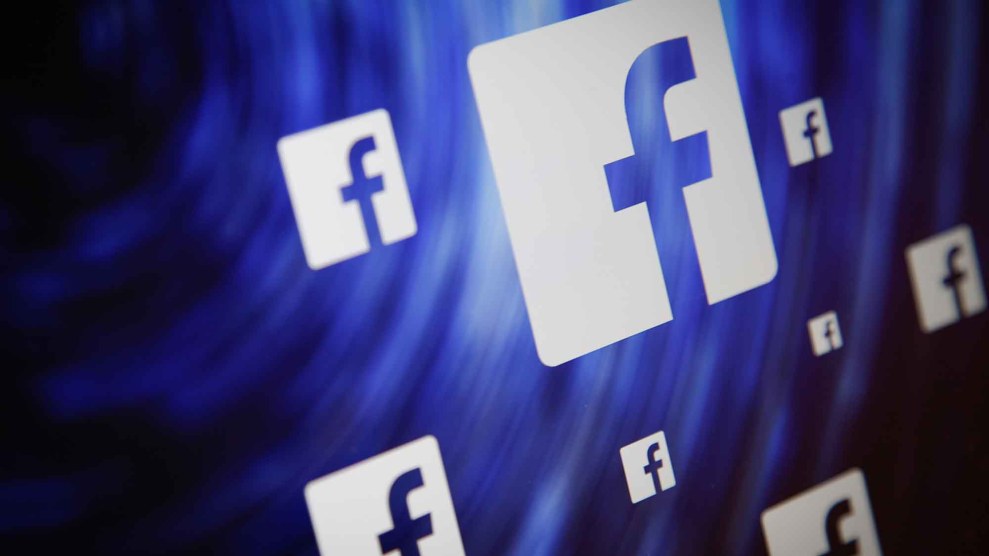
adrianhancu/123RF
From buying targeted ads, organizing rallies, and employing bots to spread false information, we now know that Russian agents have used a wide variety of techniques on Facebook, Twitter, Google, Instagram, and even Pokémon Go to sow discord during the 2016 election. Google, Facebook, and Twitter will publicly testify before the Senate and House Intelligence Committees this week.
As Facebook, Google, and Twitter have become increasingly bigger parts of the story of Russian meddling, it’s been exceedingly difficult to keep track of what’s going on. Below, we’ve created a timeline tracking some of the biggest revelations since early September.
Note: Following pressure from congressional investigators, Facebook and Twitter have slowly begun to publicly disclose the extent to which they’ve found Russian agents used their platforms. But many developments in this story are only known through news reports, often sourced anonymously. We’ve tried to note anonymous sources and how the outlets found their information, wherever possible.
Sept 6: Facebook discloses for the first time that $100,000 worth of ads were purchased on the platform by suspected Russian agents. The 3,000 or so ads, which ran from June 2015 to May 2017, were linked to 470 fake accounts and pages that were “affiliated with one another and likely operated out of Russia,” according to Facebook.
The majority of ads focused on promoting divisive social and political issues such as immigration and gun rights, but some did name Donald Trump and Hillary Clinton, according to the Washington Post. A Facebook official also told the Post that the platform found evidence of some accounts linked to the Internet Research Agency, a Kremlin-linked troll farm in St. Petersburg. Facebook shut down any of those pages that were still active. (Facebook would later acknowledge that all 470 fake accounts were connected to the Internet Research Agency.)
Facebook also found $50,000 worth of ads deemed potentially political that may have originated in Russia, though their connections are less clear.
Sept 11: The Daily Beast reports that Russian operatives used Facebook pages to organize and promote domestic political events, including protests and rallies. The events, which were promoted using paid ads, included an August 2016 anti-refugee rally in Twin Falls, Idaho, hosted by “Secured Borders,” an anti-immigrant Facebook group that has since been identified by independent Russian media outlet RBC as a product of the Internet Research Agency. Though Facebook did not provide details about the events, a spokesperson told the Daily Beast that it “shut down several promoted events” as part of its broader elimination of Russia-linked accounts, acknowledging publicly for the first time that these events existed.
Sept 13: Business Insider reports that a Russia-linked group may have been behind a Facebook page that attempted to organize anti-immigrant and anti-Clinton events during the election. The group, “Heart of Texas,” had more than 225,000 followers in the summer of 2016. It was shut down as part of Facebook’s removal of Russia-affiliated accounts, a Facebook official confirmed to Business Insider.
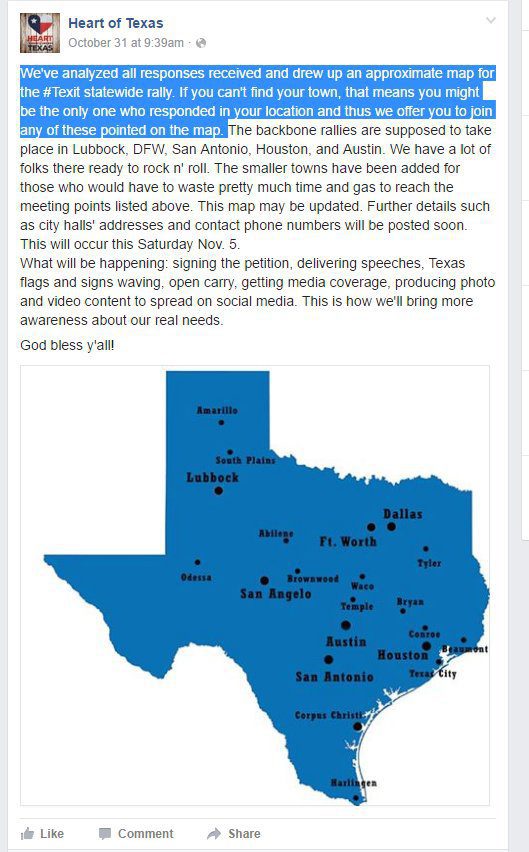
Sept 14: A ProPublica investigation reveals that Facebook’s ad-targeting services allowed companies to target users who had expressed interest in topics such as “‘Jew hater,’ ‘How to burn jews,’ or ‘History of ‘why jews ruin the world,'” which had been grouped together by the platform’s algorithm. After being contacted by ProPublica, Facebook removed the categories, and noted in a blog post that it would also remove the targeting fields that allowed people to self-report the interests.
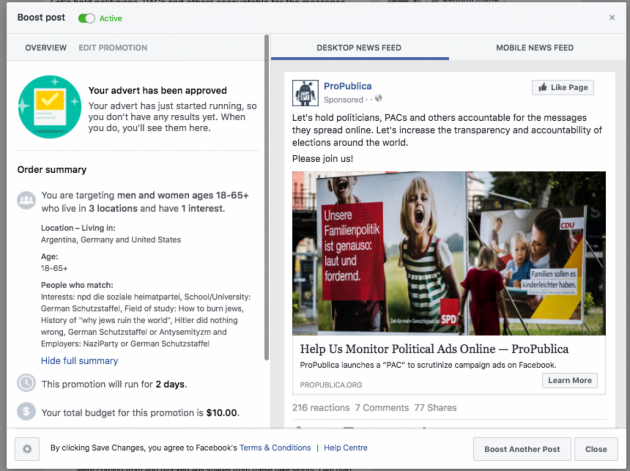
Sept 20: According to a Daily Beast report, Russian agents may have used a fake Facebook account to organize several pro-Trump rallies in Florida. The account, “Being Patriotic,” had around 200,000 followers at one point, and was able to draw Trump supporters to at least two of its events, in Fort Lauderdale and Coral Springs—the first events we know of to draw supporters on the ground. Through its accompanying Twitter account, Being Patriotic also encouraged violence (“Arrest and shoot every sh*thead taking part in burning our flag! #BLM vs #USA,” read one tweet) and for people to report alleged voter fraud.
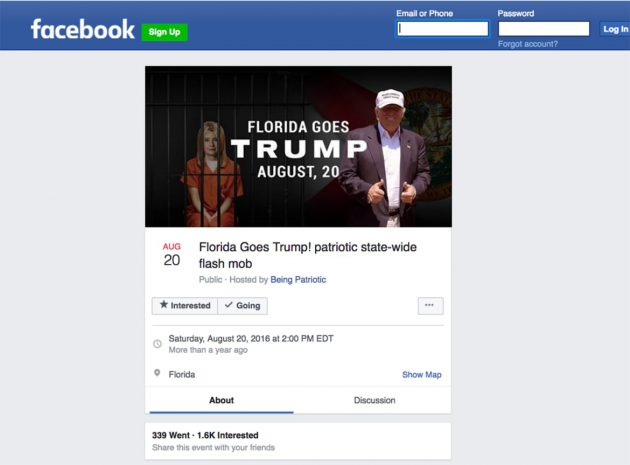
Facebook did not confirm to the Daily Beast that the account was connected to Russia, but it was shut down in August around the same time Facebook removed other Russia-linked groups.
Sept 21: Facebook says it will hand over the more than 3,000 Russia-connected political ads to congressional investigators. It had previously only given the ads to special counsel Robert Mueller in response to a search warrant, according to reports from the Wall Street Journal and CNN.
Sept 27: Multiple news outlets report that the Senate Intelligence Committee has asked Facebook, Twitter, and Google to testify as part of the investigation into Russian interference in the election.
Sept 27: The Daily Beast reports Russian agents impersonated a real nonprofit, United Muslims of America, to spread racist memes and fake news on Facebook, Instagram, and Twitter. The account, which at one point had about 268,000 followers, pushed stories claiming that John McCain founded ISIS and that Osama bin Laden was a CIA agent. It also reportedly bought Facebook advertisements and promoted rallies aimed at Muslim audiences. The Facebook page was taken down as part of the company’s broader crackdown on Russia-linked accounts. Facebook declined to comment on the story for the Daily Beast, but according to the outlet, it “did not challenge [its] reporting.”
Sept 28: A CNN report claims Russian agents used “Blacktivist” Facebook and Twitter accounts in an attempt to stir racial tensions during the election. According to two sources who spoke anonymously to CNN, the Facebook account was one of 470 the social network identified as being linked to the Internet Research Agency. The Blacktivist Twitter account was also identified by Twitter as being tied to Russia.
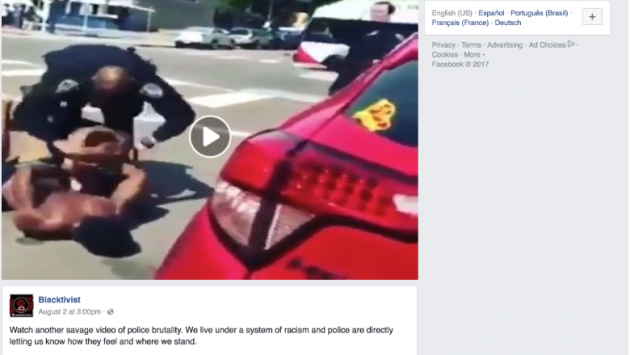
A screenshot of a Blacktivist Facebook post.
CNN
The Blacktivists Facebook page promoted at least seven rallies and demonstrations around the country in 2016. Some of the events appeared to be real events, which Blacktivists further publicized.
Sept 28: After meeting with congressional investigators that day, Twitter discloses that it found and removed 201 accounts that may have been used by Russian agents on its platform: 22 were linked to the Facebook accounts identified as connected to the Internet Research Agency, and, in addition, Twitter found another 179 Russia–related or linked accounts. None of the accounts were registered as advertisers with Twitter.
Twitter also says that the Kremlin-connected TV network RT spent $274,100 on ads on the platform in 2016. Three accounts, @RT_com, @RT_America, and @ActualidadRT, promoted 1,823 tweets that “definitely or potentially targeted the US market” and primarily promoted tweets about RT news stories.
Sept 28: A study from researchers at Oxford University, first reported in Mother Jones, reveals that Twitter users were flooded with misinformation and links to fake news stories in the run-up to the election, including from Russia-linked accounts. The trend was most pronounced, the researchers found, in key battleground states including Pennsylvania, Florida, and Michigan.
Sept 29: Google is conducting an internal investigation into whether Russian agents used its services to interfere in the election, the Wall Street Journal reports. It will also share its findings with congressional investigators, according to a source who spoke with the Journal. Earlier in September, Google had said that it had not found any evidence of Russian agents buying election-related ads.
Oct 2: Facebook estimates that ads bought by Russian agents reached around 10 million people in the US. However, Columbia University researcher Jonathan Albright argues on Oct. 5 that Facebook’s number isn’t entirely accurate. After analyzing direct interactions, such as likes, comments, or reactions to posts from just six out of the 470 Russia-linked Facebook pages, Albright estimates that around 19.1 million people interacted with those pages alone, and that its content had been shared more than 340 million times.
Oct 4: CNN reports that some of the Russia-linked Facebook ads were specifically targeted towards Michigan and Wisconsin, key states that helped Trump win the election. Anonymous sources told CNN that the ads were highly sophisticated in targeting key demographic groups and also used divisive messages, including anti-Muslim messages. It was unclear, however, when the ads ran. (Facebook has previously stated that about a quarter of the Russia-linked ads were geographically targeted.) CNN did not provide a comment from Facebook in the story.
Oct 9: The Washington Post reveals that Google has found evidence of Russian agents exploiting its platform in an attempt to meddle with the election. In an internal inquiry, according to the Post, Google discovered that Russian operatives spent tens of thousands of dollars on ads across the platform’s products, including ads associated with Google search, Gmail, and the DoubleClick ad network. What’s particularly interesting is that the ads don’t seem to have come from the Internet Research Agency, according to the Post, suggesting that Russian efforts to influence the election may be far wider in scope than even previously thought.
After the Post breaks the story, the New York Times similarly reports that Google found Russian agents buying ads on its platform. According to the Times, who spoke with a anonymous source familiar with Google’s inquiry, Russian agents bought $4,700 worth of display and search ads that included political content. These agents were believed to be connected to the Russian government. The story notes that Google also identified an additional $53,000 worth of ads that were “purchased from Russian internet addresses, building addresses, or with Russian currency,” but it was unclear whether they were connected to the Kremlin. These ads ranged widely in nature, from promoting a documentary about Trump’s golf courses in Scotland to questioning whether then-President Obama should resign.
Google did not confirm the information at the time.
Oct 18: The Daily Beast reports that Trump campaign staff and at least one member of his family promoted tweets from @Ten_GOP, an account allegedly run by the Internet Research Agency. Though the tweets are no longer available, the Daily Beast claims that campaign manager Kellyanne Conway, for instance, tweeted a post by @Ten_GOP about Hillary Clinton’s emails two days before the election. The Daily Beast says it “independently confirmed the reasons for @Ten_GOP’s account termination.” Twitter declined to comment.
Oct 24: Twitter says it will launch an “advertising transparency center” that will allow anyone to see all the ads currently being run on Twitter, how long ads have been running, and whether an ad is being run for a particular political campaign. Individual users can also see whether they are being targeted by an ad.
Oct 26: Twitter bans RT and Sputnik Media from using its advertising network, citing US intelligence reports that the organizations attempted to interfere with the election. The company said that it would donate the $1.9 million it earned from RT since 2011 to external research into Twitter’s role in elections and civic engagement. RT and Sputnik Media would be allowed to remain on the network as users.
Oct 27: Facebook says it will make advertising on the platform more transparent, including allowing users to see the ads created by any given page, requiring users buying political ads to verify their identity, and building an archive of federal-election related ads. The company will begin testing features in Canada in November, and plans to roll out features in the US by this summer, ahead of the 2018 midterm elections.
Oct 30: Facebook content created by Russian operatives may have reached as many as 126 million people in the US, a far higher number than the 10 million estimate the company previously provided. According to Facebook’s draft testimony to Congress, which was obtained by the Washington Post and other news outlets, the Internet Research Agency posted about 80,000 times between 2015 and 2017. Google also confirms in its draft testimony that the Internet Research Agency bought ads on its platform, and that Russian agents uploaded more than 1,000 videos on YouTube. Google says that the content generally had low views, with only three percent of the videos having more than 5,000 views.




